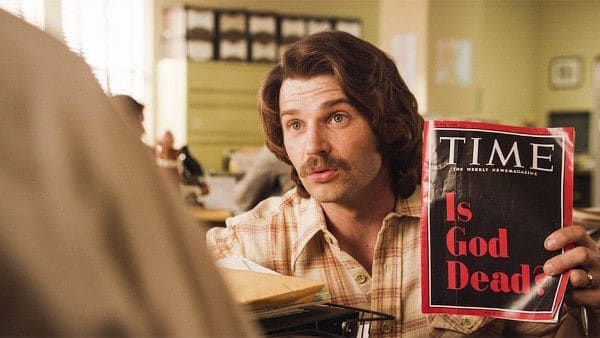Eye For Film >> Movies >> The Case For Christ (2017) Film Review
The Case For Christ
Reviewed by: Jennie Kermode

At the start of the Eighties, journalist Lee Strobel's wife became a Christian, prompting him to investigate the history of Christianity and, ultimately, to undergo his own conversion, writing a series of books related to his experience. This isn't an adaptation of the first of those, which shares its title; rather, it's a dramatisation of Strobel's early research and the personal journey that led him to change the way he looked at the world.
Significantly better made than most indie Christian films, this features a good performance from Mike Vogel in the lead, which gives it more energy that the rather bland script could otherwise achieve. It's structured like a CSI episode with a sub-plot that ties in thematically with the main one, Strobel getting in an ethical tangle as he covers the case of a young man facing prison. Although he's a journalist rather than a detective, this lends him the air of a more authoritative investigator. It's a cute trick but it can't overcome problems stemming from confusion about what evidence actually is.

Strobel's wife's conversion is prompted by one of those coincidences which naturally seem meaningful to brains wired for pattern recognition. The couple are in a restaurant with their small daughter when she starts choking. Panicking and unsure what to do, they lie her flat on her back, an action so obviously stupid that it makes it difficult to have any faith in Strobel's intellectual powers thereafter. A woman helps out; she had been going to dine elsewhere but had a feeling she needed to dine in that place that night. Otherwise, says the wife, they could have lost their daughter. Well, otherwise somebody else would probably have stepped in, but never mind - that kind of emotional response under stress is understandable. The problem is that at no point does the reasoning applied in this film become more sophisticated.
If you're going to build a story around a conversion, you really need to be able to relate to your character on both sides of that process. "We're atheists... we believe in what we can see with ouwn eyes," Strobel tells his child, and given the dodgy moustache and suede jacket she's looking at, one could forgive her if she questioned the wisdom of that - but the real problem illustrated here is the underlying notion that atheists are a collective with a set of tenets (at one point reference is made to "your theory of science") rather than being a diverse collection of individuals defined by what they don't believe. In another scene, it's stressed that famous atheist thinkers all had bad relationships with their fathers and so does Strobel. The lowest estimate of atheist numbers worldwide is 200 million. Do they all have daddy issues? Really?
By contrast, the Christianity depicted here is studiously vague - far too much so to be narratively compelling, which means viewers are unlikely to follow in Strobel's footsteps. When Strobel confronts a Christian woman about her influence on his wife, and refers to the latter as if she were his possession, it's impossible to tell how this is received - is this the kind of Christianity which perceives such attitudes as reasonable? Strobel is a dick to his wife throughout, which is one of the few things to generate any tension and forms the film's key emotional arc; in the end, the academic nature of his approach to Christianity means that the possibility of him connecting with God lacks the impact of possible reconciliation with the woman he bullies.
The academic material in the film is so lightly considered that it's difficult to pass much comment on it, but it's framed amid a succession of poorly constructed arguments which will seriously disappoint those Christians who are rigorous about their researches. Strobel says he's read Bertrand Russell, yet he clearly hasn't read a Philosophy 101 regarding what can and can't be proven. Again and again, straw men are set up to be demolished, and complex scenarios are simplified until they're easy to resolve because dozens of possibilities are being ignored. This leaves the intellectual side of the film hollow. All that really resonates is the emotional journey, and Vogel gets little support from the other actors in realising that. Overall, this feels like a missed opportunity.
Reviewed on: 07 Sep 2017
















